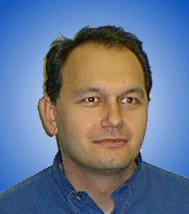Keynote Speakers
Dr Danilo P. Mandic
Towards multimodal computing:- Extracting information from signal nonlinearity and determinism
AbstractThis talk addresses the fundamental of multimodal signal processing and computing. This is becoming an increasingly important research topic, since the change in the signal modality might indicate e.g health hazard. We therefore need to detect when the nature of signals changes from, say, nonlinaer to linear one, or from deterministic to stochastic.
Tools suitable for this problem have started emerging in the physics literature in the 1990, and have only recently been extended to engineering and computing applications. In addition these approaches are only suitable for block (off-line) mode of operation, and they focus on only one aspect of the problem, that is, linear or nonlinear, and deterministic of stochastic.
In this talk we will address simultaneous treatment of signal nonlinearity and its stochastic behaviour. Our new tool, the Delay Vector Variance (DVV) method will be introduced, and its usefulness will be illustrated on several case studies covering linear and nonlinear adaptive prediction, and the analysis of biomedical data such as heart rate variability, and fMRI.
An extension of the introduced methodology suitable for on-line mode of operation will be introduced.
 Biography
Biography
Dr. Mandic received the Ph.D. degree in nonlinear adaptive signal processing in 1999 from Imperial College, London, London, U.K. He is now a Reader at the Department of Electrical and Electronic Engineering, Imperial College London, London, U.K. He has previously taught at the Universities of East Anglia, Norwich, Norfolk, U.K., and Banja Luka, Bosnia Herzegovina.
He has written over 100 publications on a variety of aspects of signal processing and a research monograph on recurrent neural networks (with J. Chambers, Wiley 2001). He has been a Guest Professor at the Catholic University Leuven, Leuven, Belgium, and Frontier Researcher at the Brain Science Institute RIKEN, Tokyo, Japan. Dr. Mandic has served a Member of the IEEE Signal Processing Society Technical Committee on Machine Learning for Signal Processing, Associate Editor for IEEE Transactions on Circuits and Systems II, and Associate Editor for International Journal of Mathematical Modeling and Algorithms. He has won awards for his papers and for the products coming from his collaboration with industry.


